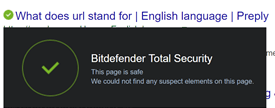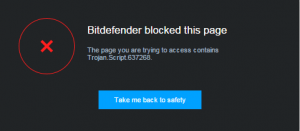Search Engines
Search Engines (Google and Bing, for example) are amazingly powerful. Information is readily accessible via a question in the search bar. But, this series of articles is about how to stay safe online and results from a search engine need to be used carefully.


The results of the search are presented as LINKS. How can you be sure that the website this will take you to is safe? This is an area where the extended antivirus suites can help. They will indicate if the site is safe or is a risk.
Google is now “encouraging” the use of greater security in websites. Hyper Text Transfer Protocol Secure (HTTPS) is the secure version of HTTP, the protocol over which data is sent between your browser and the website that you are connected to. The ‘S’ at the end of HTTPS stands for ‘Secure’. It means all communications between your browser and the website are encrypted.
![]()
![]()
Google now highlights those sites that are not secure.
Back to Staying Safe Online


